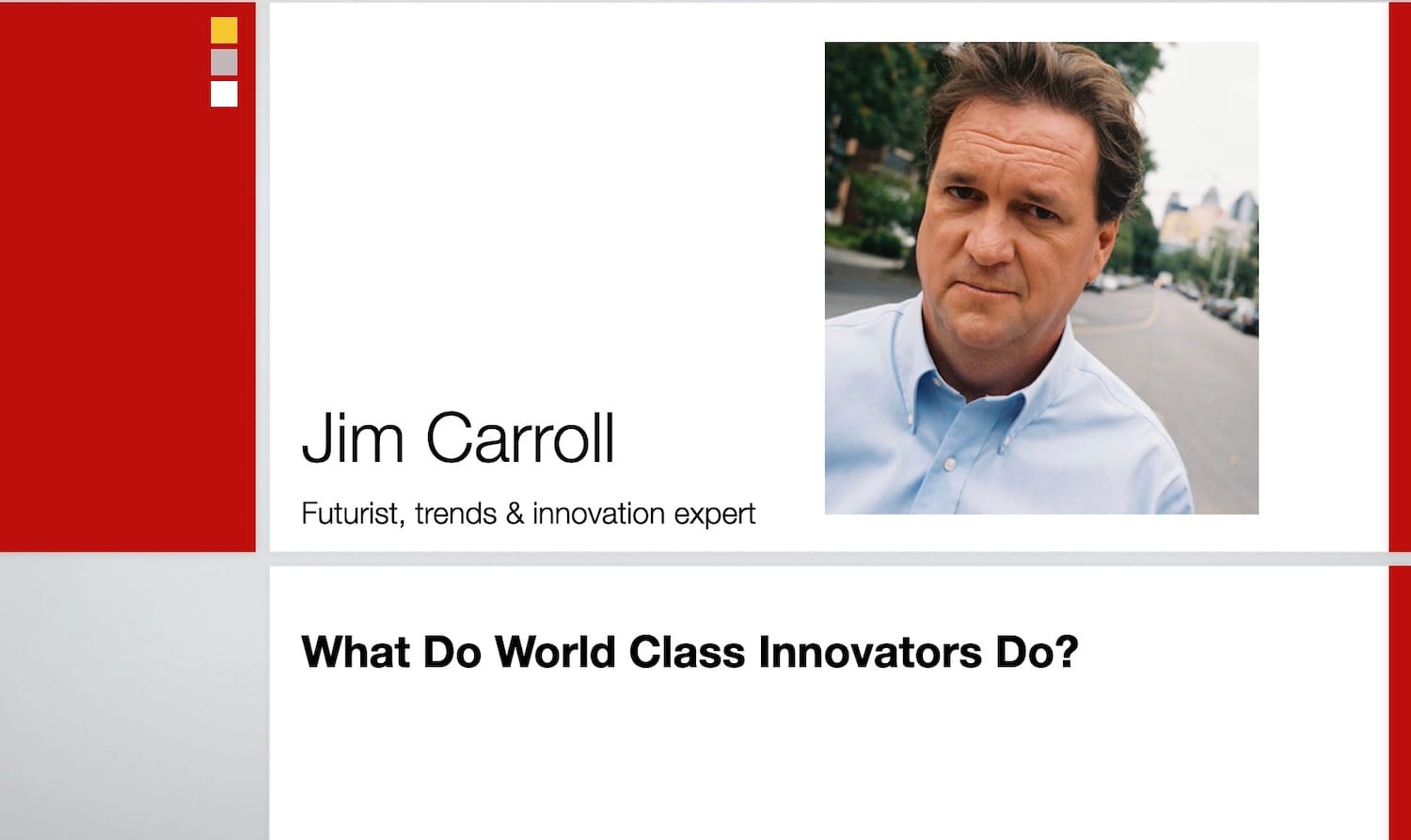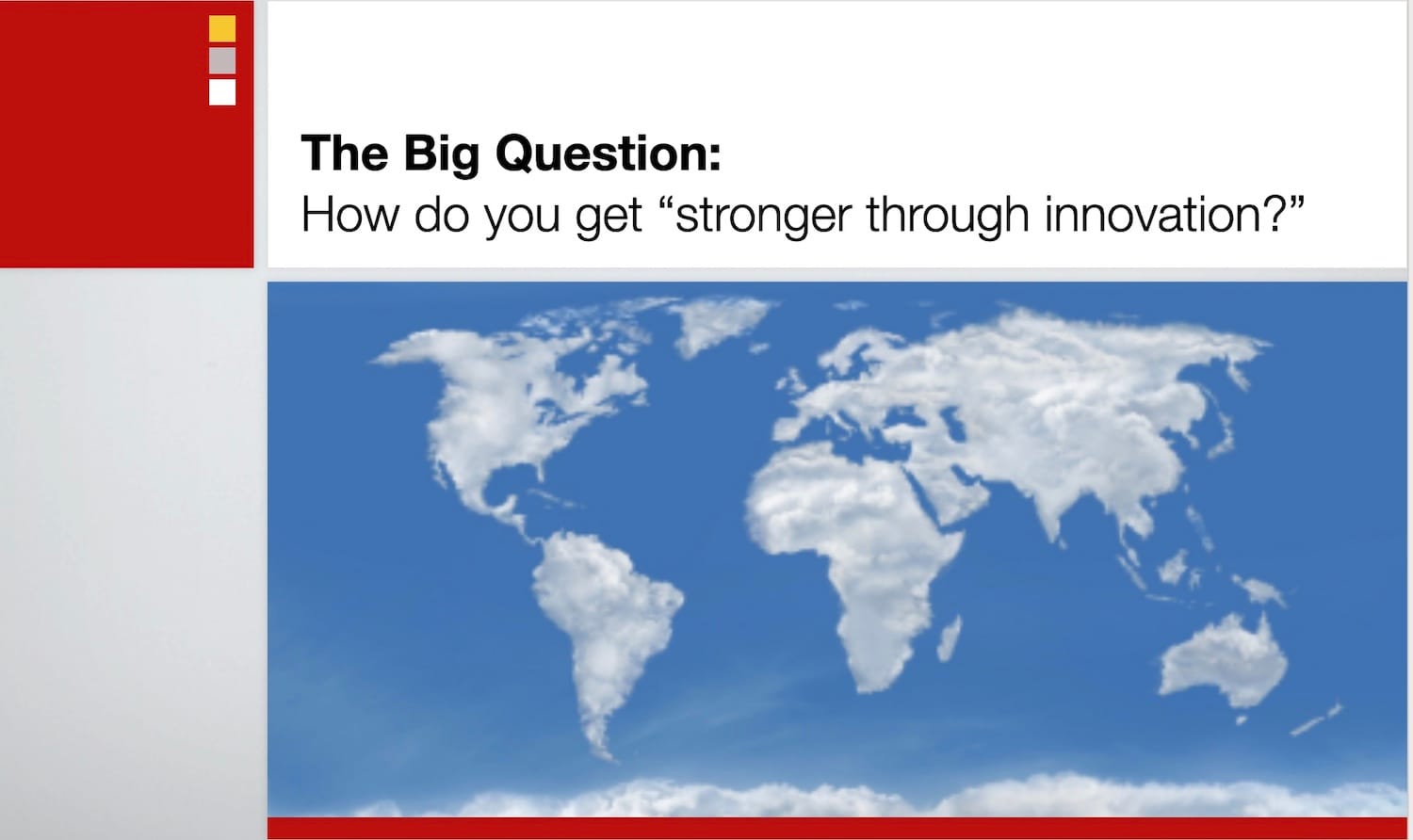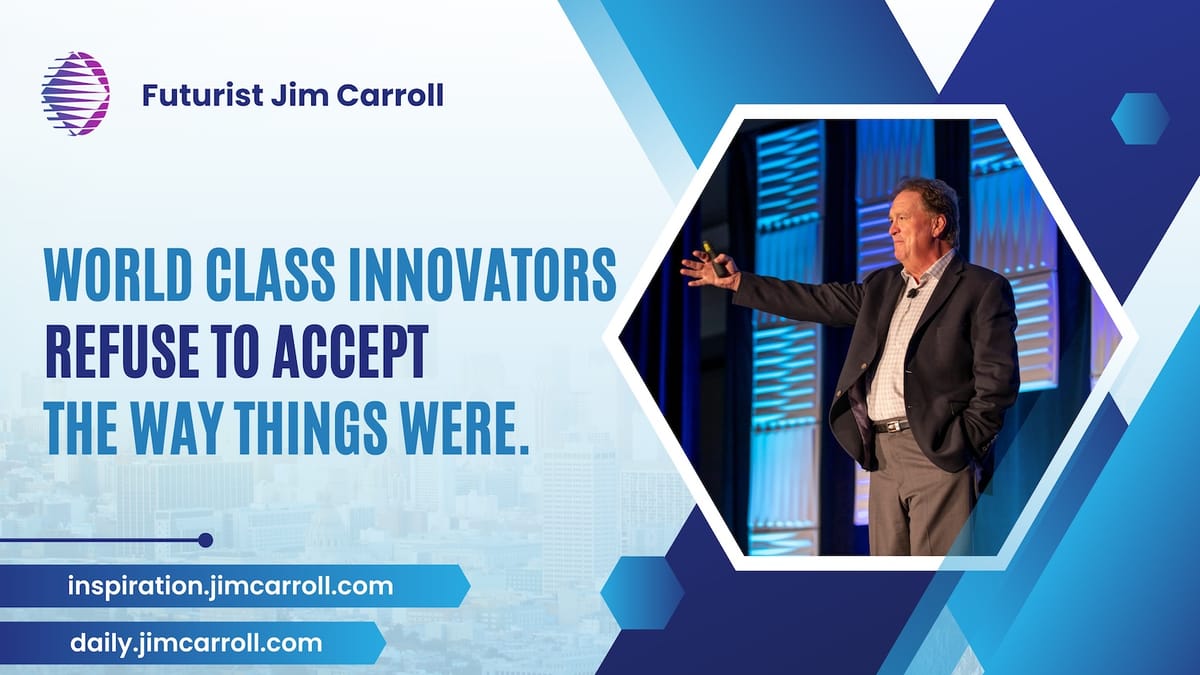"World-class innovators refuse to accept the way things were" - Futurist Jim Carroll
How do you become a world-class innovator? Not someone who merely pokes around the edges of innovative thinking and explores a few ideas here and there, but someone who truly tries to infuse the mindset of everything you do, or into every goal and action that your organization pursues.
I head to Orlando tomorrow, where I've got a repeat engagement with a client; they had me in exactly 10 years ago this week for a talk to their core client group. I dug out the slide deck I used back then to get a bit of a sense of the ground I covered with them, and it's going to provide quite a wonderful structure as I take a look at where we were a decade ago compared to now. That said, what also caught my interest was the title slide in my keynote for them 10 years ago - "What Do World Class Innovators Do?" That's because this is a theme that played into a tremendous number of keynotes from 2009 up until the pandemic in 2020.
It continues to do so. The original list used in the slide deck I used with them contained 10 key themes or actions that 'world-class innovators' undertake - valuable guidance in a fast-changing world. With that in mind, I thought it would be a good idea to take on these topics in the next two weeks of Inspiration posts - because there is some precious and invaluable insight there. Hence, starting tomorrow and running for just over two weeks, I'll cover each of these themes.
The over-arching theme in this leadership guidance? World-class innovators refused to accept that the way things were is the way things should be; they infuse the acceptance of change into everything they do. They refused the status quo, complacency, and standing still. The way things were in terms of action, strategy, mindset, and innovation won't carry them forward into the future - it will only bind them to the past. Think about that - it's a core issue that you need to adopt with everything you do!
How did the idea for a world-class innovation theme come about? Late in 2009, I was approached by a company that operates. Their original email indicated that they were looking for someone who could specifically cover a unique theme in the keynote that would launch a critical corporate strategy leadership meeting.

I responded to them with my fees and other information, and we had a bit of back and forth. They quickly returned to the world-class innovation theme.

I put some thought into that message and thought about the issue of world-class innovation. By this point in time, I'd been accumulating a lot of critical insight around innovation for close to 15 years. With a significant number of those events being leadership meetings, I realized that I already had that information - I merely had to organize my thoughts. Among my clients, I could see both winners and losers in their approach to innovation. In addition, the extensive research that I was doing for every event led me to a lot of insight as to what truly made up 'world-class innovative thinking.' With that in mind, I spent a few hours compiling that insight into a list of 10 key themes on what world-class innovators do that others don't do.
I shared the last with the client and had one more exploratory call. I got the gig and my keynote in early 2010 was launched with this slide.

The big question for this leadership team? How could they get stronger through innovation? By following the 10 key lessons from world-class innovators!

I quickly realized that the invaluable insight that I pulled together provided me with a significant structure for a keynote topic that others would be interested in - and they were! I also realized that I was challenging myself with the core idea of innovation - in my mind, I was refusing to accept that the way things were with the keynote topics I had to that point was not the way things should be going forward. I had to challenge myself to change - and so I rolled out a keynote topic description, and away we went!
The keynote description? It's over at, of course, https://worldclassinnovators.jimcarroll.com.
What Do World Class Innovators Do That Others Don't Do?
Business model disruption. The rapid emergence of new competitors. The challenging impact of social media. Rapid prototyping and the global idea machine. The digitization of everything and the impact of hyper-connectivity. Rapid technological change. All of these trends — and more — require that organizations pick up the pace when it comes to their innovation efforts.
They can do so by learning what the world’s leaders are doing with their innovation efforts. For over 30 years, Jim Carroll has had the opportunity to study what makes some organizations excel at the concept of innovation while others do not. He has carefully cataloged their approaches, attitudes, leadership styles, and strategies into a concise overview that is the secret sauce of innovative thinking.
World-class innovators possess a relentless focus on growth, continually transitioning their revenue source, and solving customer problems before the customer knows it’s a problem. They focus on upside-down innovation by sourcing innovation ideas through their customers. They concentrate on ingesting fast ideas; checking their speed focusing on corporate agility; and focusing on long-term wins through constant incremental improvements. They know that skills partnerships are a key success factor. Most importantly, world-class innovators aren’t afraid to back away from big ideas. They know that right now is a great time to make bold decisions and to take decisive advantage to forge aggressive new paths against their competitors.
While everyone else wallows in aggressive indecision and organizational sclerosis, world-class innovators know that it is a great time to do great things!
In this keynote, Jim Carroll will provide you with unique insight into what these world-class organizations and high-caliber leaders are doing, to position themselves for a future in which the velocity of change is the new normal, acceleration is the reality, agility is the core, and adaptation is the necessity!
And with that, I had the makings of a foundation that would provide for a massive number of keynotes through the next decade.
But first, the very theme itself resulted in an epic 14-minute custom video project for Deloitte South Africa - almost as soon as rolled the keynote topic out, it caught their attention and they contacted me.
More on that story to come!
Futurist Jim Carroll believes that we should never just accept the way things were - but should only accept how things could be!

